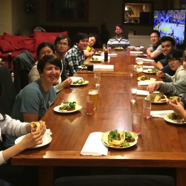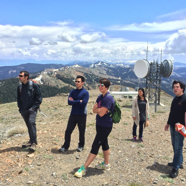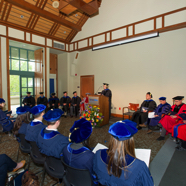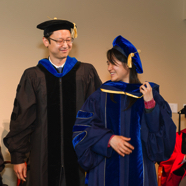New paper on culture and genes
Briefly, northern China largely relies on wheat-based cultivation, whereas souther China is largely rice-based. There are also pretty profound cultural differences. But up until now nobody bothered to quantitatively link the two and provide some rationale for why they might be connected. You'll have to read their paper for the full story, but for me it makes an incredible amount of sense, and also explains some of the regional stereotypes that every Chinese speaker would know by heart.
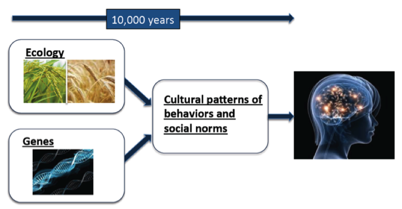
1 Kitayama, Shinobu, Anthony King, Ming Hsu, and Israel Liberzon. “Dopamine-System Genes and Cultural Acquisition: The Norm Sensitivity Hypothesis.” Current Opinion in Psychology.
Haas Profile of Lab Research
People say a lot of things, a lot of which are true but some are not. We want to develop ways to separate these.
New paper on neuroeconomics and neurology
Chiong, Winston, Kristie Wood, Alexander Beagle, Ming Hsu, Andrew Kayser, Bruce Miller, and Joel Kramer. “Neuroeconomic dissociation of semantic dementia and behavioral variant frontotemporal dementia.” Brain.
Early Career Award to Ming Hsu
Welcome Nick Angelides and Paul Krueger

Paul is also starting as a PhD student in the Cognitive Neuroscience group in Psychology. Paul received his B.A. from Princeton where he worked in the lab of Jonathan Cohen. Uniquely among psychology students, Paul is putting together his own lab rotation, where he will be working with Sonia Bishop and Rich Ivry.
NiB: Neuroscience in Business Schools
First, a neuroscientist in a marketing department will likely find him/herself to be the first and only one there. More importantly, interdisciplinary fields inevitably result in mixing of researchers coming from very different backgrounds, especially when we consider across business-related disciplines, for example between marketing, management, finance.
To address this, we created a Neuroscience in Business google group to connect neuroscience researchers in business-related fields, and to provide a resource for those interested in the area. To add please go to the webpage to sign up. Below is a brief description.
Welcome to Neuroscience in Business (NiB)! This is a group for connecting academics in business schools who are using neuroscience methods, created by Ming Hsu, Uma Karmarkar, Vinod Ventrakamen, and Carolyn Yoon. The use of neuroscientific theories and tools in business research is growing rapidly, but is still quite novel for many business schools. In addition, people in these areas may come from very different disciplinary backgrounds. We aim to build stronger bonds in this community and increase the potential for collaboration, sharing resources, and improving training, by connecting researchers in various business-related fields who are incorporating theories and data from the biological sciences. Please join us if you are either (i) a researcher in a business-related field using (or looking to use) neuroscience theories and data in your research, or (ii) a researcher in the biological sciences working on business-related topics of interest.
Lake Tahoe Lab Retreat
Congratulations Dr. Yuping Chen!
New paper on decoding brand personality
From “Where” to “What”: Distributed Representations of Brand Associations in the Human Brain
Yuping Chen, Leif Nelson, and Ming Hsu
Considerable attention has been given to the notion that there exists a set of human-like characteristics associated with brands, referred to as brand personality. Here we combine newly available machine learning techniques with functional neuroimaging data to characterize the set of processes that give rise to these associations. We show that brand personality traits can be captured by the weighted activity across a widely distributed set of brain regions previously implicated in reasoning, imagery, and affective processing. That is, as opposed to being constructed via reflective processes, brand personality traits appear to exist a priori inside the minds of consumers, such that we were able to predict what brand a person is thinking about based solely on the relationship between brand personality associations and brain activity. These findings represent an important advance in the application of neuroscientific methods to consumer research, moving from work focused on cataloguing brain regions associated with marketing stimuli to testing and refining mental constructs central to theories of consumer behavior.
New article on causal effect of dopaminergic drug on inequity aversion
Egalitarian Behavior in Humans
Ignacio Saez, Lusha Zhu, Eric Set, Andrew Kayser, and Ming Hsu
Egalitarian motives form a powerful force in promoting prosocial behavior and enabling large-scale cooperation in the human species. At the neural level, there is substantial, albeit correlational, evidence suggesting a link between dopamine and such behavior. However, important questions remain about the specific role of dopamine in setting or modulating behavioral sensitivity to prosocial concerns. Here, using a combination of pharmacological tools and economic games, we provide critical evidence for a causal involvement of dopamine in human egalitarian tendencies. Specifically, using the brain penetrant catechol-O-methyl transferase (COMT) inhibitor tolcapone, we investigated the causal relationship between dopaminergic mechanisms and two prosocial concerns at the core of a number of widely used economic games: (1) the extent to which individuals directly value the material payoffs of others, i.e., generosity, and (2) the extent to which they are averse to differences between their own payoffs and those of others, i.e., inequity. We found that dopaminergic augmentation via COMT inhibition increased egalitarian tendencies in participants who played an extended version of the dictator game. Strikingly, computational modeling of choice behavior revealed that tolcapone exerted selective effects on inequity aversion, and not on other computational components such as the extent to which individuals directly value the material payoffs of others. Together, these data shed light on the causal relationship between neurochemical systems and human prosocial behavior and have potential implications for our understanding of the complex array of social impairments accompanying neuropsychiatric disorders involving dopaminergic dysregulation.
